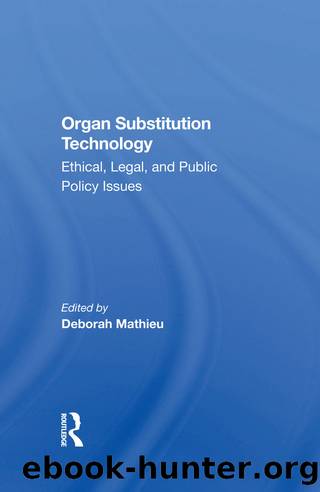Organ Substitution Technology by Deborah Mathieu

Author:Deborah Mathieu [Mathieu, Deborah]
Language: eng
Format: epub
Tags: Social Science, General, Sociology
ISBN: 9781000308600
Google: cq2bDwAAQBAJ
Barnesnoble:
Goodreads: 52145991
Publisher: Routledge
Published: 2019-06-04T00:00:00+00:00
12
Regulating Heart and Liver Transplants in Massachusetts: An Overview of the Report of the Task Force on Organ Transplantation
George J. Annas
Organ transplantation has been a favorite topic of health lawyers since its inception. Organ procurement was addressed with the adoption of the Uniform Anatomical Gift Act in all fifty states, and "brain death" has been recognized both judicially and legislatively across the country. Nonetheless, it is now apparent that the major problems in organ transplantation are not legal and thus neither are their solutions. Heart and liver transplants are extreme and expensive interventions that few individuals can afford and few hospitals can offer. In an era of economic scarcity, how (if at all) should organ transplant procedures and other extreme and expensive treatment be introduced into the health delivery system?
Although it seems reasonable to expect federal leadership to establish a limited number of high-quality transplant centers, federal efforts to date have focused almost exclusively on trying to help the scattered organ procurement agencies become more efficient. By default, the individual states have had to develop their own policies. A number of them, like California and Connecticut, have concentrated on Medicaid reimbursement requirements. Ohio has worked to develop a statewide "consortium" approach. But until late 1984, only Massachusetts had established a statewide public task force to make recommendations concerning how heart and liver transplants should be introduced. The Massachusetts Task Force grew out of a recommendation, made by Dr. Harvey V. Fineberg's earlier Liver Transplantation Task Force, that a broadly based public group examine the social issues involved with transplantation technology. The Massachusetts experience is important not only because it is the first state to utilize the strategy of a public task force, but also because of the strong medical institutions in Massachusetts, the vigorous use of determination-of-need mechanisms to regulate the introduction of liver and heart transplants, and the almost overwhelming desire of at least four Boston hospitals to do liver transplantation and of four Boston hospitals to do heart transplantation. Indeed, at times the political aspects of whether one hospital or more than one hospital should do either of these procedures have eclipsed all of the other critical issues involved in using these extreme and expensive technologies. . . .
The recommendations [of the Task Force] went to public hearing on November 5,1984, and on November 27,1984, the policy-making body of the Massachusetts Department of Public Health, the Public Health Council, unanimously adopted the recommendations as official Policy Guidelines and used the Report itself as explanatory text for the Department in reviewing determination-of-need applications for organ transplantation.
Download
This site does not store any files on its server. We only index and link to content provided by other sites. Please contact the content providers to delete copyright contents if any and email us, we'll remove relevant links or contents immediately.
Men In Love by Nancy Friday(5240)
Everything Happens for a Reason by Kate Bowler(4743)
The Immortal Life of Henrietta Lacks by Rebecca Skloot(4588)
Why We Sleep by Matthew Walker(4445)
The Sports Rules Book by Human Kinetics(4386)
Not a Diet Book by James Smith(3426)
The Emperor of All Maladies: A Biography of Cancer by Siddhartha Mukherjee(3163)
Sapiens and Homo Deus by Yuval Noah Harari(3071)
Day by Elie Wiesel(2783)
Angels in America by Tony Kushner(2662)
A Burst of Light by Audre Lorde(2607)
Endless Forms Most Beautiful by Sean B. Carroll(2483)
Hashimoto's Protocol by Izabella Wentz PharmD(2375)
Dirty Genes by Ben Lynch(2318)
Reservoir 13 by Jon McGregor(2302)
And the Band Played On by Randy Shilts(2209)
Wonder by R J Palacio(2207)
The Immune System Recovery Plan by Susan Blum(2058)
Stretching to Stay Young by Jessica Matthews(2045)
